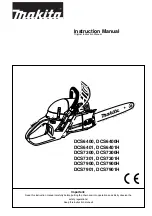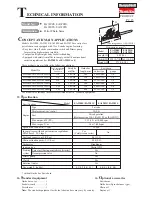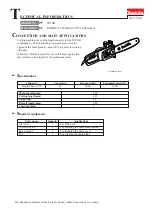
the risk of injury that would otherwise be present if the
chain continued to run after being switched off or
disconnected.
Chain brake
The chain brake is a safety mechanism which is
triggered via the front hand guard (Fig. 1/Item 2). If
kickback causes the chainsaw to suddenly jerk back
then the chain brake trips and stops the saw chain in
less than 0.1 seconds. You must check the operation
of the chain brake on a regular basis. To do this, fold
the hand guard (Fig. 1/Item 2) forward and briefly
switch the chainsaw on. The saw chain must not start
up.
Pull back the front hand guard (Fig. 1/Item 2) until it
engages to release the chain brake.
Caution:
Never use the saw if the safety equipment is
not working properly. Never try to repair safety related
protection systems yourself – always have any work
done by our service department or by a similarly
qualified workshop.
Hand guard
The front hand guard (which also acts as the chain
brake at the same time) (Fig. 1/Item 2) and the rear
hand guard (Fig. 2/ Item 15) protect against finger
injuries resulting from contact with the saw chain if the
chain breaks because it is overloaded.
6. Working with the chainsaw
6.1 Preparations
To ensure that you can work safely, check the
following points before every use:
Condition of the chain saw
Inspect the chainsaw before the start of work for
damage to the housing, the power cable, the saw
chain and the cutter rail. Never use a chainsaw which
is obviously damaged.
Oil container
Fill level of the oil container. Even while working, keep
checking that sufficient oil is in the system. To avoid
damaging the chainsaw, never run the saw if there is
no oil in the system or if the oil drops below the “min”
mark (Fig. 10/Item B).
On average, a single filling will last around 15 minutes
depending on the number of pauses in cutting and
the loads involved.
Saw chain
Tension of the saw chain, condition of the cutting
elements. The sharper the chainsaw, the easier and
more controllable it is to operate the chainsaw. The
same also applies to the chain tension. Again, while
working also check the chain tension every 10
minutes in order to increase your safety. New saw
chains in particular often tend to expand more.
Chain brake
Check the operation of the chain brake as described
in the chapter “Safety devices” and then release it.
Safety clothing
Always wear appropriate tight-fitting safety clothing
like special trousers which protect against cuts,
protective gloves and safety shoes.
Hearing protection and protective goggles.
When felling trees or performing forest work, always
wear a protective helmet with integral face and
hearing protection. This will offer protection against
falling branches and any branches if they spring back.
6.2 Description of the correct procedures for
basic use of the chainsaw
Felling a tree (Figs. 14-17)
If two or more persons are working at the same time
on felling and cutting back then the minimum distance
between the tree being felled and the tree being cut
back should be at least twice the height of the tree
being felled (Fig. 14). When felling trees, care must be
taken to ensure that no other persons are
endangered, no power supply lines are hit and no
material damage is caused to equipment or property.
In the event that a tree comes into contact with a
power supply line, he responsible power supply
company should be informed immediately.
When working with the saw on a slope, the operator
of the chainsaw must be standing at a higher point on
the slope than the tree being felled, as the tree will roll
or slip downhill once it has been felled (Fig. 15).
Before felling the tree you must first plan and if
necessary clear an escape route. This escape route
must lead away diagonally in the opposite direction to
the expected fall direction – this can be seen in Fig.
16 (A= danger zone, B= direction of fall, C= escape
zone).
Before felling the tree you must take into account the
natural inclination of the tree, the location of larger
branches and the wind direction, as this will help you
to correctly determine the direction in which the tree
will fall.
Dirt, stones, loose bark, nails, staples and wire must
be removed from the tree.
GB
20
Anleitung_RG_EC_2240_SPK1__ 04.02.14 09:45 Seite 20
Summary of Contents for RG-EC 2240
Page 4: ...4 4 5 8 9 7 6 B A Anleitung_RG_EC_2240_SPK1__ 04 02 14 09 45 Seite 4 ...
Page 5: ...5 12 10 11 14 15 13 A 14 B Anleitung_RG_EC_2240_SPK1__ 04 02 14 09 45 Seite 5 ...
Page 7: ...7 24 22 23 26 27 25 19 Anleitung_RG_EC_2240_SPK1__ 04 02 14 09 45 Seite 7 ...
Page 8: ...8 28 20 Anleitung_RG_EC_2240_SPK1__ 04 02 14 09 45 Seite 8 ...
Page 89: ...89 Anleitung_RG_EC_2240_SPK1__ 04 02 14 09 45 Seite 89 ...
Page 90: ...90 Anleitung_RG_EC_2240_SPK1__ 04 02 14 09 45 Seite 90 ...
















































